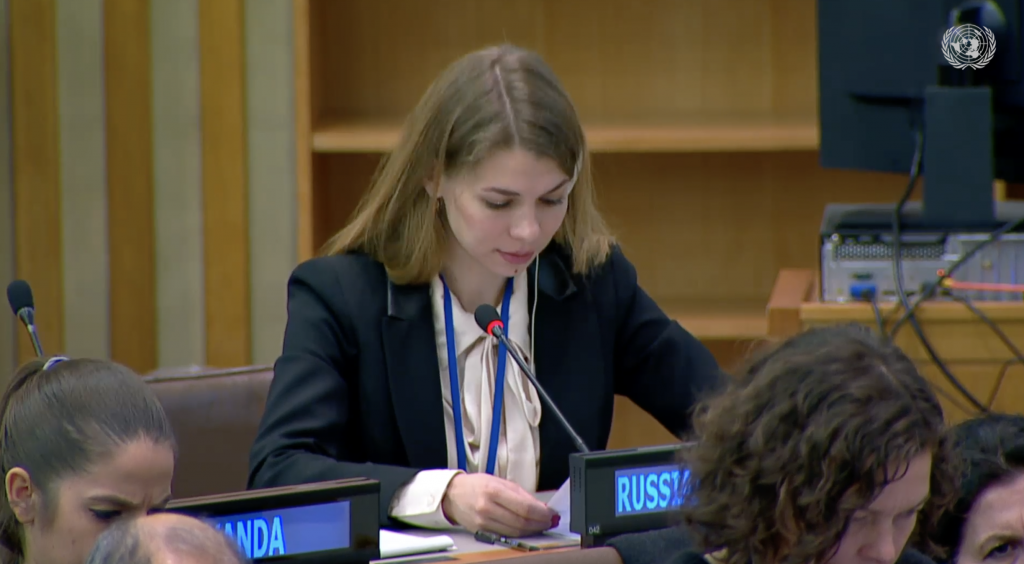Statement by Representative of the Russian Federation Ms.Irina Tyazhlova at the Sixth session of the UN Open-Ended Working Group on security of and in the use of ICTs 2021-2025 under agenda item "Rules, norms and principles of responsible behavior of States"
Mr. Chair,
The mandate of the Open-ended Working Group (OEWG) approved by all UN Member States tasks us to continue, as a priority, to develop rules, norms and principles of responsible behavior of States in information space. We consider it imperative to strictly follow this guideline.
In our view, unjustified bias in favor of implementing only the existing list of voluntary, non-binding rules of behavior – either during discussions or in the outcome documents of the OEWG – represent a distortion of the mandate of the Group that provides for the development of new norms as a priority. Moreover, it is unacceptable to impose on States various forms of reporting on the implementation that have not been agreed upon under the UN auspices until the respective legal obligations are assumed.
Russia and a number of other countries consistently advocate for the need to agree upon a comprehensive universal set of rules, norms and principles of responsible behavior and make them legally binding. We are pushed towards this measure by both the rapid developments in the ICT realm and the insufficiency of existing voluntary rules to effectively regulate this area.
In this regard, it would be appropriate to resume the consideration of States’ views on this matter set out in the Chair’s summary of the first OEWG. For our part, we suggest discussing the following specific principles and proposals:
1. the sovereign right of each State to ensure security of its national information space, as well as to establish norms and mechanisms for governance in its information space in accordance with national legislation (A/RES/73/27, PP 16, 18; A/RES/75/240, PP 17, 19);
2. prevention of the use of ICTs with a view to undermining and infringing upon the sovereignty, territorial integrity and independence of States (2021 OEWG Chair’s summary, A/75/816, para 20; 2021 GGE Report, A/76/135, para 70), as well as to interfering in internal affairs of sovereign States (2015 GGE report, A/70/174, para 71 (c); contributions of Iran and China to the 2021 OEWG Chair’s summary, A/75/816; SCO International code of conduct for information security, A/69/723, para 3);
3. inadmissibility of unsubstantiated accusations brought against States of organizing and committing wrongful acts with the use of ICTs, including computer attacks, in particular, with a view to imposing various restrictions, such as sanctions and other response measures (2021 OEWG Chair’s summary, A/75/816, para 15; 2021 GGE Report, A/76/135, para 71 (g); 2015 GGE report, A/70/174, para 28 (f));
4. settlement of interstate conflicts through negotiations, mediation, reconciliation, or other peaceful means of State’s choice, including through consultations with participation of competent national authorities of States (2021 GGE report, A/75/816, para 35).
These norms are derived from the concept of a UN Convention on International Information Security, which Russia, together with a group of states, presented at the beginning of 2023 – to the OEWG and as an official document of the 77th session of the UN General Assembly. The document is intended to promote the prevention and peaceful settlement of conflicts and the exclusively peaceful use of ICTs, as well as to serve as a basis for cooperation between States for these purposes. We look forward to a constructive discussion of our initiative in the OEWG on an equal footing with other proposals of States. We assume that the future universal mechanism should be developed under the UN auspices, taking into account the opinions of all Member States within the framework of a specific negotiation format to be established and tasked accordingly.
Thank you for attention.
